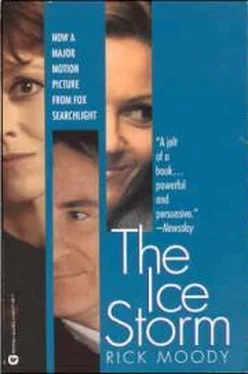Rick Moody - The Ice Storm
Здесь есть возможность читать онлайн «Rick Moody - The Ice Storm» весь текст электронной книги совершенно бесплатно (целиком полную версию без сокращений). В некоторых случаях можно слушать аудио, скачать через торрент в формате fb2 и присутствует краткое содержание. Город: New York, Год выпуска: 1997, ISBN: 1997, Издательство: Warner Books, Жанр: Современная проза, на английском языке. Описание произведения, (предисловие) а так же отзывы посетителей доступны на портале библиотеки ЛибКат.
- Название:The Ice Storm
- Автор:
- Издательство:Warner Books
- Жанр:
- Год:1997
- Город:New York
- ISBN:0-446-67148-7
- Рейтинг книги:4 / 5. Голосов: 1
-
Избранное:Добавить в избранное
- Отзывы:
-
Ваша оценка:
- 80
- 1
- 2
- 3
- 4
- 5
The Ice Storm: краткое содержание, описание и аннотация
Предлагаем к чтению аннотацию, описание, краткое содержание или предисловие (зависит от того, что написал сам автор книги «The Ice Storm»). Если вы не нашли необходимую информацию о книге — напишите в комментариях, мы постараемся отыскать её.
The Ice Storm — читать онлайн бесплатно полную книгу (весь текст) целиком
Ниже представлен текст книги, разбитый по страницам. Система сохранения места последней прочитанной страницы, позволяет с удобством читать онлайн бесплатно книгу «The Ice Storm», без необходимости каждый раз заново искать на чём Вы остановились. Поставьте закладку, и сможете в любой момент перейти на страницу, на которой закончили чтение.
Интервал:
Закладка:
This was perhaps a useful moment to fix a drink.
Because of anxiety, he suffered the following: a mild case of eczema, which broke out all over his body, mostly in winter, and which turned his skin a patchy orange; piles, because he could move his bowels only after a comfortable day at work and these were now few; a duodenal ulcer, which he treated with liberal doses of antacids and by eating primarily foods that were white (rice, oatmeal, Cream of Wheat hot cereal, white bread, potatoes, the occasional glass of milk or slice of American cheese); a swelling in his feet which he imagined was gout; a noticeable enlargement of his liver and pancreas; and canker sores.
Most of all he suffered from canker sores. The very survival instinct of his cells seemed to have failed in the small pursed region of his mouth. The cells there no longer cohered; they opened up crevices and left them open. Hood’s canker sores tormented him constantly. He often had two or three a week. On occasion he had more than a dozen at one time. Most prominently, these occasions were (1) during his second year at boarding school, (2) in the weeks of college after he broke up with Diana Olson before he began to date her roommate, now his wife, Elena O’Malley, and (3) during Lent of 1971, when he had given up tobacco, caffeine, and alcohol.
Benjamin Hood believed himself to be a record-holder among those afflicted with mouth sores. He got canker sores on his lips, in the back of his throat, on this tongue. He got long, narrow ones in his gums that looked like irrigation ditches.
Citrus, ketchup, spices — these were all contraindicated. As was the act of speech.
Yes, there was a shadow urge behind his pox, and Hood could pinpoint it. The imprecision of speech, its risky improvisations and inventions — it was best to shut himself and his canker sores out of all regrettable conversations.
Had he not as a young man abandoned a career as a radio broadcaster for the more concrete world of securities analysis? Was it not language and its insidious step-relative, sentiment, that so destroyed his mouth?
Ridiculous. He could remember his first canker sore, sometime in the midst of WWII, and it had nothing to do with speaking in class or with being seen and not heard. Nothing to do with speech at all. Born of Yankee stock, and that was all, born of farmers who spent whole afternoons on the porch without directing a word at their people, born of Yankees who would invite any stranger to their homes for Thanksgiving and engage them in conversation not once.
He just didn’t feel like talking.
Where was Janey? It was after four. Dusk had fallen. Anxieties clamored in him. The cures for canker sores, the charlatanical cures, the sorts of American Indian mystical stuff his wife might have suggested — lecithin, yogurt cultures, vitamin B12 in large doses, nuts, citrus, prayers to St. Christopher — he enumerated these, as he also considered the performance, in light trading, of the entertainment stocks he analyzed for Shackley and Schwimmer.
The Williamses had moved in about the time his own son, Paul, had gone off to school. Three years ago? The Williams boys — Sandy, thirteen, and Mikey, fourteen — were just behind Paul and Wendy, sixteen and fourteen, respectively, but they were all friends anyway. This didn’t mean that Hood approved of the situation. Janey’s kids were inferior company for his own. Mike was a dim, sinister boy, graceful as an aluminum baseball bat. And Sandy was genuinely creepy. A scheming and reticent cynic. Sandy marketed incorrect answers to math tests, just for fun. He would grow up to own one of those stores that sold telephone bugs, high-powered telescopes, and other surveillance devices. He would drink and watch neighbors masturbate.
Jim Williams, their father, did nothing particularly. His work consisted entirely in dreaming up half-baked investment schemes, the sort that required willing suspension of disbelief. Williams was an early investor in those little Sty-rofoam packing curlicues and a videotape gizmo with which star athletes could review their own performances. Especially with this device, Williams seemed to have defined a need. That business school stuff sank right in with him. The videotape machine generated both capital and notoriety. Williams brought home professional athletes Seaver and Koosman to meet his boys. The urchins of the neighborhood hovered out in the street, on their banana-seated Schwinn Typhoons, to watch the progress of superstars.
Williams’s professional sloth didn’t seem to bother anyone but Benjamin. Hood believed in the stolid riders of the New Haven line, those grailing knights, legendary heads of household whose leadership was marked chiefly, though not entirely, by intimidation. Jim Williams, on the other hand, purchased Marimekko place mats. He purchased a water bed and Cadillac sedan. He said far out occasionally. He disappeared on obscure business trips for several weeks at a time. He was a golden retriever in temperament — a slobbering, friendly type — but he was also a liar, a teller of fish tales. The way he told it himself, Williams paddled through the white water of 1973 and it was just a charming shallows. He never had bad luck. He never had a bad day.
But his worst crime was this: he didn’t prize his wife. Jim Williams. A good guy.
The vodka catalyzed this vengeful litany. Hood looked at his carefully folded trousers, his checkered cardigan sweater-they were piled on a wicker chair under the window — and wondered if he should dress, if Janey was waiting for him to dress so she could disrobe him all over again. Maybe that was it. It was some sort of erotic game. Of course. Like teenagers arriving for strip poker in thirteen layers. Hood wouldn’t convert to nudism-there were no nudist beaches in Fairfield County anyway — but he liked a game.
It never did to compare your wife and your mistress, because your wife always won, the way the classics were better, the way the jazz standards had nuances no other songs had. Still, those pop ditties of the moment could sometimes get stuck in Hood’s head. Sometimes they articulated a whole season of trouble at the office. Sometimes they articulated the sorrow in a stalled marriage. His loneliness. Then the strings swelled in the bridge and those songs weren’t so bad after all. He and his wife were well suited to one another, really. For example: in the cessation of all intimate contact. They didn’t make love anymore. For almost two years, it hadn’t occurred to them.
Family, what a flawed system of attachment! Stalin took children from their parents and raised them as wards of the state. Love, according to Mao’s little red book, was no excuse to procreate. These weren’t such terrible approaches to the problem. Here, in the Northeast, you ran off with your mistress yet still loved your wife. Because you hadn’t yet comforted your mistress in sickness and she hadn’t yet seen you cry over a blowout or strike your own son. And she hadn’t grown tired of your two poorly articulated philosophical positions (that a stint in the national service builds character and that no man should ever teach secondary school) or happened upon your concealed hatreds of certain ethnic groups. In time, though, she and your wife grew alike — maybe they even became friends. Then you fell for a new mistress.
Elena had been shy and beautiful and stoic and brilliant. He knew this the way he knew that certain films were great because he had adored them when he was young. Now he might sleep through these same films on television, but he loved them still. Elena had been shy and brilliant and beautiful and impossible to talk to.
At a party in 1956, where there had been a competent jazz band with a locally prominent drummer, a party where conversation had lurched and turned awkwardly and no one seemed to be setting their feet down exactly in time, where Benjie Hood was drinking away the remorse of romantic failure with Diana Olson — she was present in the room and dancing with some other guy — at a party while cold rain and snow pelted the greater Boston area. Hood had first plied his suit. Maybe it wasn’t that evening itself that he remembered now, maybe it was only the stories of that evening, but he hung on to those stories anyway. He told and retold them.
Читать дальшеИнтервал:
Закладка:
Похожие книги на «The Ice Storm»
Представляем Вашему вниманию похожие книги на «The Ice Storm» списком для выбора. Мы отобрали схожую по названию и смыслу литературу в надежде предоставить читателям больше вариантов отыскать новые, интересные, ещё непрочитанные произведения.
Обсуждение, отзывы о книге «The Ice Storm» и просто собственные мнения читателей. Оставьте ваши комментарии, напишите, что Вы думаете о произведении, его смысле или главных героях. Укажите что конкретно понравилось, а что нет, и почему Вы так считаете.












